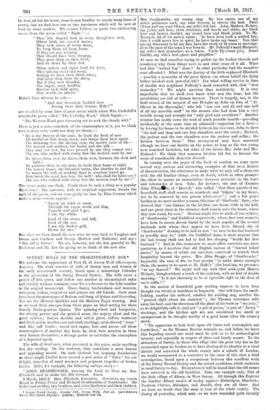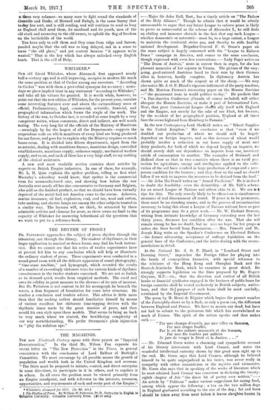SURREY WILLS OF THE SHAKESPEAREAN AGE.*
WE welcome the appearance of Part II. of Surrey Ilrills (Herringman Register). The work consists of wills of Surrey men and women of the early seventeenth century, based upon a manuscript Calendar in the possession of the Surrey Record Society. The wills cover a period or five years, and follow one another in chronological order and entirely without comment, save for a reference to the folio number in the original manuscript. These Surrey husbandmen and weavers, watermen, tailors, carpenters and joiners are old friends. Such must have been the prototypes of Bottom and Snug, of Quince and Starveling. Nor are the Mistress Quicklys and the Mistress Pages wanting. And as we read tbcre emerges from these pages an ideal setting for these homely Shakespearean figures. The spinning-wheel and fourposter, the shining pewter and the painted arras, the napery chest and the great caldron ; fustian doublet and velvet glove, taffeta waistcoat and black jerkin, woollen coat and cloth stockings, satin-sleeved " truss " and fine ruff bands ; sword and rapier, bow and arrow—all these commonplaces of another day have, by their bare mention in these very human documents, a strange power to revitalize the atmosphere of a departed epoch.
The wills of dead men, when presented in this guise, make anything but dry reading. On the contrary, they constitute a most human and appealing record. On such skeleton but inspiring foundations as these might crabbo hare created a new series of " Tales " for our delight, comedies of rural manners and poignant tragedies of broken hearts. Take, for example, the following embryo story :- "JOHN BRADBROOKE, praying the Lord to bless my dau. Elizabeth and to make her His servant. Amen.
0 March, 1602-3. Dau. Elizabeth Executrix. Overseers, my cousin Wood in Friday Street and Richard Gouldsmithe of Southwarke. My father and mother, two brothers, and sister Katheryn and their children.
• Surrey Reprd Society. Number VII., Surrey Wills, Part II. ptre7deseonry Court, lierrinvnun Register.) London; Howarth and Co. Mrs. Gouldsmithe, my cramp ring. My two aunts, one of my wife's petticoats each, my aunt Iverson to choose the best. Peter Cleton and my aunt Cleton, my wife's felt hat. John, Mathew, Robert, my jerkin and hose, cloth stockings, ruff bands and shirts, my black hose and fustian doublet, my round hose and black jerkin. To Mr. Bonnyck, £4 of his money again ; he have been such a wicked boy, that 1 could never live in quiet, he have broke my heart.' You that are my Overseers to lot my dau. have her stock at 18 years or marriage. £5 to the poor of the town I was born in. Mr. Pollerdy's maid Margaret, my wife's best stomacher, as a token. Uncle Dyverson [sic]. Joann Smithe, my wife's best purse and pinpillow."
At once we find ourselves trying to gather up the broken threads and wondering why these things were so and what came of it all. What had that " wicked boy " done ? In what particular had tho nameless aunt offended ? What was the destiny of the little orphaned Elizabeth —possibly a namesake of the great Queen—on whoso behalf the dying father invoked such powerful aid ? For what willing service in time of trouble was neighbour Pollcrdy's maid rewarded with that " best stomacher" ? Wo might question thus indefinitely. It is very improbable that we shall ever know what was the issue, but the possibilities are full of human interest. There is tragedy, too, in the brief record of the bequest of one Ifewghe ap John ap Pue, of "At. Olaves in the Burroughe," who left " one cow and £3 and one half of all my movable stuff " to the woman who had done him a very terrible wrong and wrought his " only grief and overthrow." Another testator has rashly sown the seed of much possible trouble—providing incidentally at the same time an admirable suggestion for a farce— by leaving his house to be divided between his two sons, John to have " the hall and shop and two fore chambers next the street ; Richard, the parlour and the two chambers over the parlour and cellar; the kitchen between them." This arrangement may have answered (though wo have our doubts on the point) as long as the two young men remained bachelors, but what of the future Mrs. John and Mrs. Richard ? Wo think that common kitchen bid fair to become the scene of considerable domestic discord.
In taming over the pages of the book at random we come upon several very curicus and interesting examples of that most human of characteristics, the reluctance to make what we may call a clean cut with the old familiar things, even at death, which so often prompts the effort to ensure an immortality—however material—in the tents and tabernacles of men. Take, for instance, the case of Yeoman John Whapatt, of "Horzcll," who willed "that these parcels of my household stuff shall remain as standards and lingers' in my house, " not to be removed by any person whatsoever " ; and a few pages further on we meet another yeoman, this time of "Shalforde" fame; who decreed that " one furnace in the kitchen, one frame table in the hall, and one great chest in the chamber shall remain unto the house, where they now stand, for ever," Mention might also be made of two widows, of "Southwarke" and Guildford respectively, whose first care seems to have been to ensure decent burial by the most popular of the several husbands with whom they appear to have been blessed, aho of "Southwarke" desiring to be laid to rest " as near to her last husband as possibly may be," while the Guildford dame is most anxious that the last trump shall not fail to find her sleeping " beside her first husband" ! And in this connexion we must allow ourselves one more quotation, as it involves that old English custom of "funeral baked meats," by means of which our ancestors contrived to stretch their hospitality beyond the grave. Mrs. Alice Bragge, of "Southwarke," bequeaths the sum of 40s. to four gossips " to make merry amongst them, the money to be spent at Mr. Relic's " (the local inn, we presume) "at my funeral." We might well say with that arch-cynic Horace Walpole, though without a touch of his cynicism, with no hint of double meaning : " Is it not charming to be so agreeable right to the door of one's coffin ? "
In the matter of household gods nothing appears to have been thought too trivial or worthless to bequeath. One will leave his small- holding, another his orchard, another his ambling nag, another the " painted cloth about his wainscot " ; the Thames waterman wills away his boat, and the shearman all the plant of his trade or " mystery," as he delightfully calls it ; and yet " a pot of grease," a pair of " Jarzey " stockings, and the kitchen spit are not considered too small or unimportant to be thought worthy of a good home after the owner's death.
" 'Tis opportune to look back upon old times and contemplate our forefathers," as Sir Thomas Browne reminds us, and before we leave this beguiling record one word must be said as to its archaeological interest, and especially in respect of place and family names. To the detractors of Surrey, to those who allege that the great city has so far encroached upon its borders as to have destroyed its identity as a rural district and converted the whole county into a suburb of London, we would recommend as a corrective to the error of this view a brief investigation, based upon a comparison between this excellent work of the Surrey Record Society and the actual conditions which maintain in rural Surrey to-day. Everywhere it will be found that the old names have survived in the old localities. Take one example only, that of the little village of Albury, in West Surrey. All through this Register the familiar Albury names of to-day appear—Risbridgers, Shurlocks, Peahen, Chitties, Aldridges, and Amens, they are all there. And we have no doubt that the same is true of the whole county. The Surrey of yesterday, which sent—as we were reminded quite recently
n /hese very columns—so many sons to fight round the standards of Greta:Irina and Drake, of Howard and Ralegb, is the same Surrey that te.ffisy has sent, and is still sending, and will continue to send as long as England shall need them, its manhood and its youth, men of the old stock and answering to the old names, to uphold the flag of freedom on the battlefields of the world.
You have only to call them and they come from ridge and furrow, puzzled maybe that the call was so long delayed, sad in a sense to leave " tho old place," and yet content because " it appears we're wanted." That is the key which has always unlocked every English heart. That is the call of Duty.



































 Previous page
Previous page